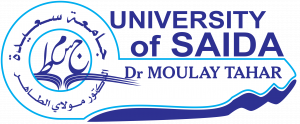Literature
Aperçu des semaines
-
-
Presentation of the Module and Course Content
Faculty of Letters, Languages and Arts
Teacher: Dr. Amaria MEHDAOUI
Coefficient: 03 Credit: 04
Sampling: Third Year Licence Students
Semester: First Semester
Timing: Lecture 1h30mn Td 1h30mn 1/ Week
Evaluation: 50% - 50%
Final Objectives:
(a) Students will have an idea about twentieth century political, economic, and historical changes in Europe in general and in UK and USA in specific,
(b) They will examine the influence of the previously mentioned aspects on the ideological and philosophical arenas,
(c) They will finally indulge into the literary movement of the time Modernism, its characteristics, and different styles it beholds; and then will be introduced to Postmodernism,
(d) A discussion of different literary texts and styles will relate theory to practice at the end.
Final Aims:
The Aims of the Course
(a) Students will be able to discuss twentieth century historical and philosophical effects on literature,
(b) By providing a sum of philosophical, social, and psychological concepts, students will improve critical thinking,
(c) Literary involvement in the texts and a personal reflection into everyday life will be the final target of these lectures.
-
